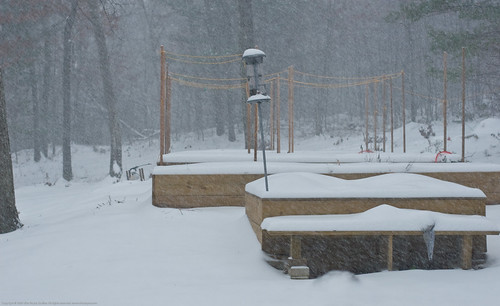
It is December 28th and our garden is buried under winter’s snow. Its quite a change from this last summer, huh?

Our chicken family has had it’s first tragedy with the death of a beloved silkie bantam, making my daughter Q very sad. We buried Snowball the silkie bantam with a ceremony of appreciation for her loving ways and the burning of dried sage. We were shin-deep in snow so the ceremony was a quick one.

We have been experiencing a good amount of snow and some interesting ice species. We had hoarfrost here last week, very interesting stuff.

Now that the fall holidays are out of the way, I am feeling a very strong urge to start the planning for our next growing season. We need to be efficient with our time and resources as we set up to start some plants indoors and also set up some heavy duty row covers out of doors for when the sun warms us a bit.
What I learned last summer with respect to our intensive raised bed growing:
- No corn in our planters
- No squash of ANY kind
- No delicate and overgrowing cherry tomatoes
- Grow all vine crops in designated non-bed growing area (more about this later)
- No snow peas
- Respect rigorously the projected height of plants and plant accordingly
- Get companions in early
- Use row covers on delicate crops for bugs from day one
- Grow for immediate use and not for storage (this is our family’s way and I dont see it changing fast)
- Plant a kid garden to allow younger kids to grow and futz with their own
- Plant chicken feed cover crops to fill in between grow seasons and also between crops and companions
- Plant many more marigolds
- Get those marigolds started as early as possible
- Grow tomatillos as pollinator attraction but not IN the beds
- Grow tomatoes in lower beds, not main beds
- Grow lots of pick-again crops like lettuces (this is what this family likes the best)
- Grow cucumbers in non-bed areas
- Grow more pollinator-attractive flowers in and around main beds
Animal predators were not a problem at all!
Thats just a few of my lessons! I can tell you that organic gardening is the ONLY way for me because I can not feed my kids veggies made toxic by chemicals, just can’t. Although I am a scientist (or perhaps because of it?) I find the thought of figuring out the right pesticide and how much etc etc tedious and makes me anxious of overdose (as well the potential for a child or pet to eat the stuff by accident).

In terms of what we will grow this year, think delicate leaves, plump tomatoes, crispy radishes, ponderous pumpkins, squashes and cucumbers, delicious green beans, tasty herbs.
Our raised beds will be bursting with mescluns and other greens, peppers, carrots, beets, beans, chickpeas, onions, eggplants, broccolis, rabes, bok choys, and more.
I am hungry just thinking about it all!.















